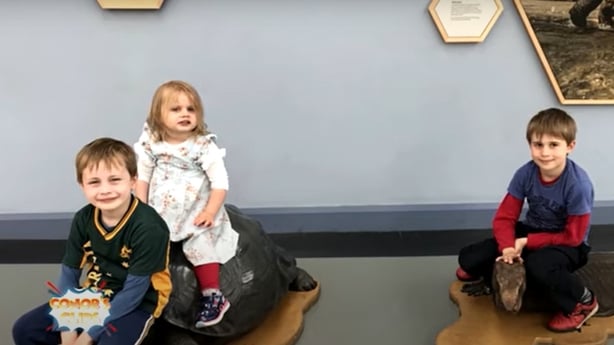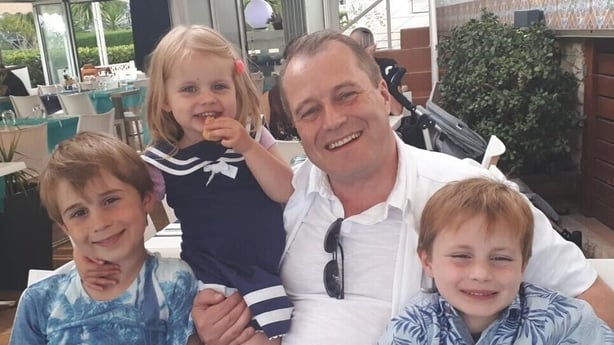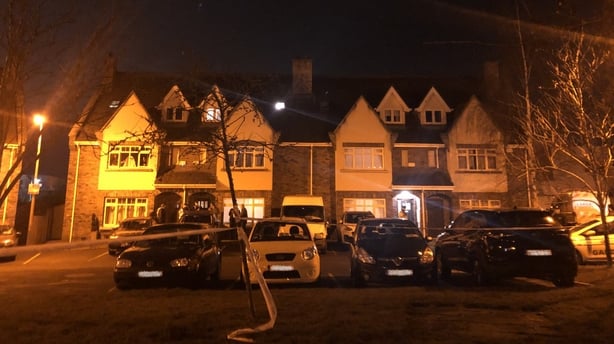A 44-year-old woman on trial for murdering her children told her eldest child she was sorry as she suffocated him, the Central Criminal Court has heard.
Deirdre Morley from Parson's Court in Newcastle, Co Dublin, has pleaded not guilty by reason of insanity to the murders of nine-year-old Conor, seven-year-old Darragh and three-year-old Carla McGinley at their home, in January last year.
The court heard she was suffering from a mental disorder at the time and believed the children had been damaged by her.
Ms Morley’s doctors had written to St Patrick’s Hospital in Dublin at the time of the killings, the court heard, recommending that she be readmitted to inpatient psychiatric care.
We need your consent to load this rte-player contentWe use rte-player to manage extra content that can set cookies on your device and collect data about your activity. Please review their details and accept them to load the content.Manage Preferences
"A tragedy of unspeakable proportions," is how defence counsel, Michael Bowman described this case.
Ms Morley was a highly trained nurse who specialised in renal care at Crumlin Children's Hospital. She had been struggling with her mental health in the year or so leading up to the tragedy.
Detective Sergeant Dara Kenny agreed with Mr Bowman that Ms Morley had been finding it difficult to cope with stresses at work.
She felt she had too much responsibility due to staff shortages, and had taken the loss of a child in her ward particularly badly.
In July 2019, she was admitted to St Patrick’s Hospital as an inpatient where she remained for four weeks.
After she was released she appeared to be doing well, the court heard. But she herself felt she was doing "too well".
She told gardaí she was "elated, over-functioning, not sleeping very well".
She was cooking, baking, inviting people over, trying to make up for lost time.
Her family were concerned that this was not normal behaviour and her medication was reduced.
She then had a period where she was relatively well, she told gardaí. But her family remained worried and her husband, Andrew McGinley, as well as two of her sisters, set up a WhatsApp group with her to discuss how best she could be supported.
In November 2019, Ms Morley told gardaí that she started to go downhill again. But this time she did not want to go back to hospital, so she tried to "power through," - functioning minimally, getting the kids to school, cooking dinners, trying to see friends and go for walks.
But her state of mind made it more difficult to carry out these activities.

She said she had always been hard on herself and those feelings intensified.
She worried about her children and about the effect her illness had on them.
She described how she wanted to "evaporate", she did not want to be alive, and at some point in the week leading up to 24 January 2020, she began to think she could not leave the children behind.
She planned they would all go together, she told gardaí. She said she never wanted to hurt the children, but she started to feel she had damaged them and that they were broken like her. She did not tell anyone how dark her thoughts had become.
Ms Morley told gardaí she had discussed some of her worries with her husband, but he did not know they were as severe as they were.
He told her the children, who were described by all who knew them as "fantastic" and "impeccably well-behaved", were fine.
Sergeant Kenny told prosecuting counsel, Anne Marie Lawlor that on the evening of 23 January, while her husband was on a business trip to Cork, Ms Morley attempted to drug the children.
She put morphine into her sons’ cereal and crushed up a strong painkilling tablet into her daughter’s juice drink in her sippy cup.
However all three noticed the strange taste and spat out their food and drink immediately. Ms Morley and the children went to bed and she told gardaí she felt she had missed her chance to carry out her plan before her husband came home.
The next day, Ms Morley kept her seven-year-old son, Darragh home from school as he had been unwell during the week.
She did not send three-year-old Carla into crèche. Nine-year-old Conor went to school as usual.
That morning she began arguing with Darragh about screen time.
It was something she said she gave herself a hard time about - the children spending too much time on screens.
Darragh told her she was mean and began arguing with his little sister about his toys.
At some point around midday, Ms Morley said she looked at the clock, and something clicked within her.
She said she remembered thinking "I could smother him now, I could kill him now."
Ms Morley suffocated Darragh using tape, a plastic bag and a cushion, while his little sister watched television in another room.
She said she wanted to stop but could not.
She took his body upstairs and placed it in her bed before smothering Carla in the same way.
At some point, while this was happening, the court heard that Ms Morley’s niece texted her about wedding invitations. "So exciting!" Ms Morley replied. She later told gardaí that as she texted, she was thinking about what she had done, or was in the process of doing. She believed Darragh was dead at that stage.
Ms Morley then went down to the school to collect Conor.
He was not due to finish until later in the afternoon, but she signed him out early "for family reasons" and told him it was because a man was coming to fix the boiler.
A parent who saw her at the school described her as having a disturbed look.
On the way back to the house, they stopped at Tesco, so he could buy his favourite roll for lunch.
Back at the house, she allowed Conor to have some screen time and to pick a movie they could watch together, telling him the other children were not at home.
He chose "Jurassic World". While he was sitting in the "play-tent" in front of the television she told him she wanted to play a game with him and encouraged him to put tape on his mouth and a bag on his head to see if he could still talk.
She told her son it was a game she used to play at school.
When Conor realised it was no longer a game, he said "Mum, stop". Ms Morley said he was probably frightened at that stage.

She told him she was really sorry and suffocated him.
She told gardaí she was thinking that she could not do it, that it was awful, but at the same time she was thinking that she couldn’t not do it as the other two children were already dead.
How would he be if he knew his mother had killed his siblings, she asked.
The court heard Ms Morley had written two notes while Conor was watching television.
The first warned anyone who came into the house, not to go upstairs where the bodies of Carla and Darragh lay in bed.
She had to amend this note to include the front room as Conor was too heavy for her to bring upstairs.
The second note was longer. It read: "I’m so sorry, I could see no future with disturbance and mental illness. I had to take them with me. This is my fault, I am broken, and couldn’t be saved or fixed. I had love and support but I couldn’t continue to live with myself. I am so sorry."
Ms Morley’s intention was to take her own life. She had gathered together medication and a half bottle of wine and drove off towards a bridge on the N7 road taking tablets as she drove.
Just as she arrived, she crashed into a lamppost and was found by a woman who was also a nurse, and also, coincidentally, called Deirdre.
This woman insisted on driving her home and stayed around until she was assured by Ms Morley that she was OK.
Ms Morley then tried to get a taxi to return to the same spot but could not get one. She set off on foot but was picked up by a taxi driver who noticed she was unsteady on her feet.
She managed to tell this driver the name of the estate she lived in before becoming unconscious in the back of the car.
During the day, Mr McGinley had been in regular contact with his wife, updating her on when he expected to be home.
There was nothing in these conversations which gave him any cause for alarm.
One of the phone conversations took place after Ms Morley had crashed her car, in the presence of the nurse who had found her.
She told gardaí she found it unusual that Ms Morley did not tell her husband what had just happened.
Mr McGinley arrived back in the estate minutes after an ambulance arrived to attend to his wife.
She was unconscious and being looked after by paramedics. But his children were nowhere to be seen.
He called their childminder, to be told that the children were not with her.

Entering the house, with ambulance and fire brigade staff, he found the body of his eldest son in the living room. Carla and Darragh were upstairs.
Detective Sergeant Kenny agreed with Ms Lawlor that the levels of distress in the house were "extraordinarily high". There were no significant injuries on any of the bodies. All three had died from asphyxia.
Ms Morley remained in an induced coma until 27 January when she woke at Tallaght Hospital.
In three interviews with gardaí, she went into extensive detail about what she had done to the children.
Sergeant Kenny agreed she became upset, distressed and tearful at different stages.
Asked at one point by a garda if she wanted a drink of water, she replied "I just want them back".
The court heard that Mr McGinley had not been fully aware of the details of his wife’s treatment and medication for her mental health. Because she was a highly qualified nurse, she dealt with many of the details herself.
Only afterwards did he discover that the doctor and clinic she was attending as an outpatient had both written to St Patrick’s Hospital, seeking her readmission.
Detective Sergeant Kenny agreed with Mr Bowman that people close to Ms Morley would have been unaware of how rapid her mental deterioration had been.
Her categorisation of the children’s misbehaviour bordered on delusional, he agreed, and did not reflect the reality of the situation at all.
Two consultant psychiatrists are due to give evidence about Ms Morley’s mental state.
Anne Marie Lawlor said they had both concluded that she suffered from a mental disorder.
One had diagnosed her with a recurrent depressive disorder, the other with a bipolar affective disorder, the jurors were told.
To find her not guilty by reason of insanity, the jury must find that she was suffering from a mental disorder and that she should not be held responsible for the murders because she did not know the nature and quality of her actions, or she did not know they were wrong, or was not able to stop herself carrying them out.
Mr Justice Paul Coffey will explain this further to the ten men and two women before they begin considering their verdict.







